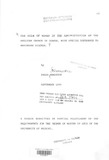| dc.description.abstract | This thesis is a study on the role that women play in the administration of the Anglican Church in uganda, with particular reference to Namirembe diocese. It analyses the participation of women in the church's administration and the factors that affect it. This study was carried out mainly because of the increased awareness of the importance of women in the development process throughout the world, as well as the increased concern about the minimal participation of women in the decision-making bodies - both in governments and non-governmental organizations. In the church, the on-going debate on the ordination of women to priesthood reflects this concern. The basic objectives of the study were mainly to find out whether women's participation in the administration of the church has been influenced by the Bible, which is the basis of the church; and also by African cultures in which the church was planted. It was also intended to find out how the nature of the administrative structure has influenced the partici~tion of women within it. Namirembe diocese, with the intention to find out people's views about the role of women in the church, particularly in administration. Three categories of people were interviewed - the clergy, lay-women and lay-men. Some church records were also studied and some meetings attended with the purpose of ascertaining the actual participation of women in the church. All this, together with the literature studied, led to the findings of this study. The findings are basically three. The first is that Kiganda culture has had a strong influence on the role of women in the Anglican church in Uganda. The traditional view that women's subordinate role in matters of leadership is God-given is very prevalent in the church today, where it is often backed up by usually one-sided literal interpretations of Bible passages which concern women. This aspect is clearly dealt with in chapters three and four of this study. The second finding is that although women are very active in the church as members of the congregations, and as the ones most responsible for the economic sustenance and social life of the church, they are lacking in ""'the decision-making bodies. of the church. This is considered in chapter five, in which the role of women in the Anglican Church in Uganda, both in history and today, is discussed. Thirdly, the nature of the administrative structure of Church of Uganda (which is dealt with in chapter six) is such that women have little chance to participate in its administration. This is because many of the church's administrative bodies are open to priests more than the laity for participation. There are no women priests in Namirembe diocese. The suggestions for further action arising from this study all revolve around a call for change in outlook. The church in general, needs to change its attitude towards women's role in the church. The leadership, in particular, needs to change the administrative structure so that women's chances for participation in church leadership are enhanced. | en |

